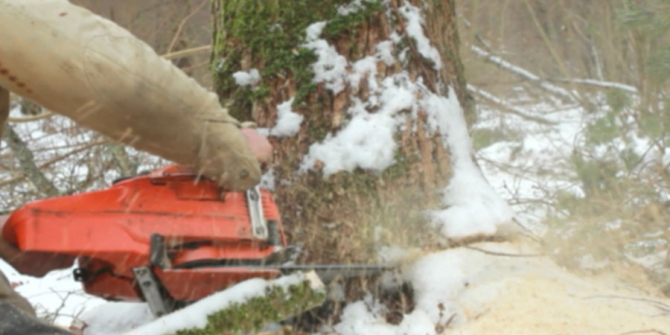The forestry sector is of vital importance, not just for personal enjoyment, with over half of the population visiting woodlands in the past few years, or even for the survival of many animals and insects. It is also vital to the infrastructure of our economy, bringing in billions of pounds each year. Such is the demand for goods that 6,000 hectares of new woodland were created in 2015/16 bringing the total area of woodland in the UK to 3.16 million hectares (to visualise, this is bigger than the island of Hawaii which is 2.83 million hectares and has a population of 1.42 million). The UK is currently the third largest net exporter of forest goods, behind China and Japan.
Although accidents have declined in recent years, worryingly, they are still higher than in agriculture and manufacturing. As the demand for goods continue, are we doing all we can to help protect the thousands of people that are putting themselves at risk each day?
Can’t see the wood from the trees?
Unfortunately, the challenge of protecting workers involved in forestry work is a complex one. The very nature of this sector presents its own set of dangers, with working at heights, unpredictable weather changes and potential injuries caused by animals just a few of the hazards faced by workers.
This problem is further amplified due to the diverse set of workers within the industry, ranging from ecologists to maintenance staff, gardeners and landscapers - all of whom have different job requirements, expertise and levels of training. These staff are often expected to work alone or remotely for long periods in situations involving many different hazards including moving parts, falling objects and confined spaces.
The Risk to Lone Workers
Dense woodland, the potential for poor mobile signal and working with machinery all combine to significantly increase the risk to lone workers in this industry, whilst hard-to-reach areas with tough terrain, few roads and unpredictable weather make a rapid response by the emergency services difficult.
Since lone workers will often be scaling trees to carry out their duties, falling from heights poses the most common risk, with 25 cases alone being reported in 2015/16 http://www.hse.gov.uk/treework/resources/casestudies.htm. It is therefore crucial that the alarm can automatically be raised in such circumstances, even if an employee is sadly incapacitated. Automated solutions will not prevent the fall, but they can help for example LONEALERT’s Man Down and Man Down Plus detects falls, it audibly warns the users and then raises the alarm if there is no response.
In addition to the obvious risks, lone workers can find themselves working in remote areas where mobile coverage is often patchy or non-existent, so having another means to raise an alarm and get help quickly in the face of an accident is essential. LONEALERT’s Anywhere solution offers one way to address this challenge, with satellite communicator equipped with GPS technology enables lone workers to be monitored and protected anytime, any place providing a peace of mind for the lone worker.
As discussed different roles may require different levels of protection, this may sound complex, but the LONEALERT platform allows as many users as needed to have different devices with different alarm escalations - all of which are all controlled within the platform.
Taking Responsibility
Protecting lone workers in this sector is complex and providing a diverse workforce with the right solutions is a huge challenge. It demands that companies, supervisors, health & safety managers carefully assess the risks, especially when assigning lone working staff. Lone workers also need to take responsibility for themselves by assessing the risks, ensuring they are adequately trained and by taking care of themselves. This is about minimising risks and creating a culture that prevents accidents and ensures lone workers have the best possible protection.

